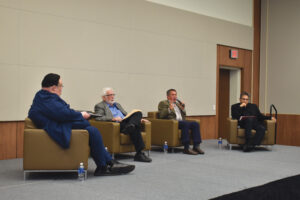
Today marks 200 days since Hamas’ invasion of Israeli territory. At last Tuesday’s panel, however, Political Science professor David Takitaki remarked that the conflict in Palestine stretches farther back than “the lifespan of everyone in this room.”
At the David L. Eisler Center, the “Understanding Gaza” panel featured three guests from the University of Michigan – Dearborn and Wayne State University. The stage held Takitaki as moderator, political scientist Ron Stockton, Islamic studies historian Saeed Khan and Judaic studies historian Howard Lupovitch.
The majority of the audience remained silently engaged as the discussion continued until 8:30 p.m., an hour and a half past its scheduled end time. One student broke this silence when Lupovitch identified himself as “proudly Zionist.”
Welding engineering technology senior Forrest Hamilton booed the speaker, calling Lupovitch a “colonizer.”
“Zionism is founded in a colonial mentality,” Hamilton said. “I think anybody should oppose people that come to talk about allowing people to be settlers, allowing people to take land or allowing colonization. I would not support this sort of rhetoric if it was coming from somebody who wants to own native Americans’ land in the United States… or any land that is not theirs.”
Lupovitch stated that his identity as a Zionist, someone who believes in the Jewish people’s right to a homeland in Israel, coexists with his belief that Palestinians are also entitled to a state of their own.
“I am a Zionist. I’m also pro-Palestinian. I’m someone who believes at the heart of this conflict are two peoples with a deeply rooted historical connection to the same land,” Lupovitch said.
The panelists swiftly continued their discussion with Lupovitch, stating, “You’re not the first person who’s yelled at me.”
This event was the collaborative effort of Ferris’ Shoah Project, the Political Engagement Project and the Provost’s Office. Provost Bobby Fleischman later gave the panel a 10/10 score for their dialogue and respect for one another.
“Bravo for Professor Takitaki’s outstanding moderation and the skillful way he massaged the several recalcitrant audience remarks in a very respectful way that allowed for the audience to express their views without interrupting the panel discussion,” Fleischman said.
Fleischman also lauded the panelists for staying respectful of each other’s rights and sovereignty despite ethnic and religious differences.
Lupovitch and Khan are longtime colleagues at Wayne State. Throughout the discussion, they referenced each other’s work where they agreed and offered counters where they disagreed.
Amidst larger conversations, one-state and two-state solutions, Khan argues that a three-state solution may be worth considering.
“I think a one-state solution and a two-state solution might fall thin,” Khan said. “A three-state solution of a confederation of former British Mandate of Palestine states, Jordan, Israel and Palestine, based on the 1967 borders might be something plausible.”
Lupovitch, familiar with his colleague’s work, excitedly awaited to hear the theory once again. He predicted that when historians discuss the plan years from now, he will call it the “Saeed Khan plan.”
“Please. I don’t want anything named after me, whether this or gymnastics move,” Khan said.
Khan was not the only panelist who has spent time imagining how such a longstanding conflict could one day be resolved.
Stockton, a political science professor at the University of Michigan-Dearborn, has researched the Israeli-Palestinian conflict for decades. He approached the discussion from an analytical standpoint, beginning with South Africa’s accusation against Israel of genocide at The Hague.
According to Stockton, any sort of solution to this conflict would require a “black swan” event. This is an unpredictable scenario outside of normal, reasonable expectations.
“…my black swan, this sucker’s out there,” Stockton said. “And it doesn’t give a damn what we think. Our morality? Forget it. Our logic? Forget it.”
Stockton, a self-proclaimed pessimist, maintained his belief that “history doesn’t care who’s right.” His theory for a potential black swan event, something large enough to disrupt the conflict, involves improvised nuclear weapons.
“You could get cesium [from a hospital] and you could create a dirty bomb,” Stockton said. “You put it in a backpack, you’d walk into downtown Tel Aviv and stand in front of the Israeli military headquarters, and you blow yourself up. What you’ve done, is you have irradiated five to 10 square blocks of Tel Aviv, where 40% of all Israelis live.”
During audience questions, Stockton offered advice to listeners who felt urged to help those affected by the violence in Gaza.
“The Israelis are going to do what they’re going to do, and the Palestinians are going to do what they’re going to do in this, and all we can do is be appalled. Maybe you can take a little step in saving your soul if you actually talk to someone whose family is involved in this,” Stockton said.
By the end of the panel, the sun had set outside the David L. Eisler Center. The majority-student audience listened patiently for two and a half hours, then respectfully applauded the panelists before returning home.
CE – RS
